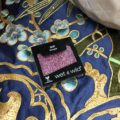What’s With All These Damn “Sewists”?
So I stumble on some YouTuber (we won’t waste time mentioning who) giving a screed about how “sewist” is too a word and how she doesn’t wanna use a “gendered” word like “seamstress” because sexism or whatever.
You sure about that? Or rather, you sure that it’s “seamstress” that’s sexist and not your weird hang-up about using it?
I rarely throw around the term “internalized misogyny” but if ever there was a case for it, it’s women who get the vapors over being called a term that specifies they’re women.
Look, my paternal grandmother was a seamstress and my paternal grandfather was a tailor, ditto at least one of his brothers. I’m nowhere near as skilled as they are, though I have made things as complicated as a Victorian steel-boned corset perfectly tailored to my measurements of the time as well as velvet coats and more skirts than I can remember.
And I’m a chick last time I checked.
So that makes me a seamstress, albeit a lazy one (eyes the heaping “to sew” pile… shudders… goes back to pretending it doesn’t exist until after I finish the Ricky B. Rat book…)
And since I don’t make money at it (remember kids: clients are the devil, customers are what you want, preferably via automated drop shipping), that makes me an amateur seamstress.
I’m not bothered by it being a specifically female term because I’m female and I don’t see anything wrong with that, plus to me there’s something about avoiding female terms that’s oddly misogynistic… reminds me of being a kid in the 80s when my mother and my aunts were career women who looked down on traditionally female jobs in a rather pathological way. Like if you had good grades and a high IQ you would be wasting that on sewing or knitting or cooking.
These traditional skills, you see, were beneath them, and best left to third world women in sweat shops (or teenagers in the case of food prep). We were better than that now.
Not that my mother wouldn’t begrudgingly go with me to the fabric store, and even pay for my supplies sometimes, but always with a sigh like she hoped I’d grow out of such an old-fashioned hobby.
So when I see the YouTubers who get all bent out of shape and butthurt over the word “seamstress,” I think of my mother and her pissy attitude towards “women’s work.” And I tend to assume that like my mother, these gals have been brainwashed into thinking there’s something wrong with being a woman (which is funny considering how many of them also spout feminist ideals and talking points) and that’s why they can’t stand to be called a woman’s title like “seamstress.”
Kinda like you get the quilters who can’t stand being called a quilter (why, cause it’s mostly women who quilt?) and insist on being called a “textile artist”… well, to me if you’re a textile artist that means you’re doing some sort of interdisciplinary art with textiles and you need the broader term because it’s not simply a quilt and you want to avoid confusion, but in many cases, it is simply a quilt, albeit a very artsy and perhaps complicated one, but there seems to be a hang-up over being a “quilter” in a way that seems equally strange and pathological.
I’m a quilter too… albeit it a lazy one (the heaping pile of quilts that need finishing is at least tucked out of sight in a drawer unit, lol…). And I have done things that would certainly fit more with the “textile artist” label, but to me they’re separate but related pursuits… kinda like I’m a cartoonist but I’m also a ceramicist and most of my ceramics involve my cartoon characters… any why do I say I’m a ceramicist and not a potter? Well… “potter” tends to imply wheel throwing, which I hate, and a certain experience level that lends itself to nice tidy uniformity of output… whereas I like handbuilding pieces that most assuredly are not uniform. And left to my own devices, my work is more sculptural than utilitarian… oh, there’s another good one: I’m an amateur sculptress.
But back to “sewist”… my God, what an ugly, awkward word. And a vague one. And now, clearly, one that pretends to be inclusive and friendly while actually masking some hostility.
Perhaps rather than demand we all change our terms to suit their issues, they ought to spend some time investigating why it is they’re so uncomfortable with those terms. What is it about “seamstress” that so perturbs them? And why is it anyone’s problem but their own?



